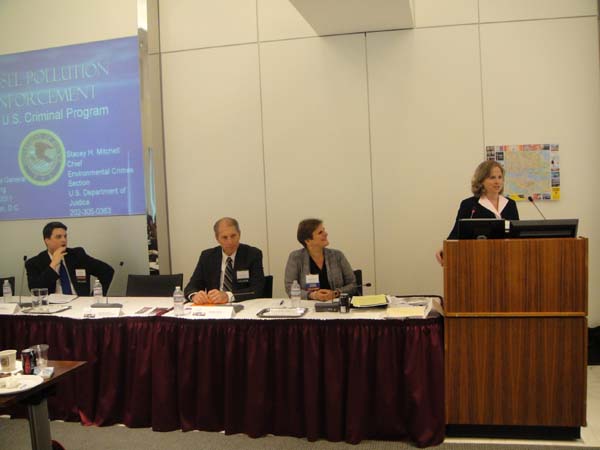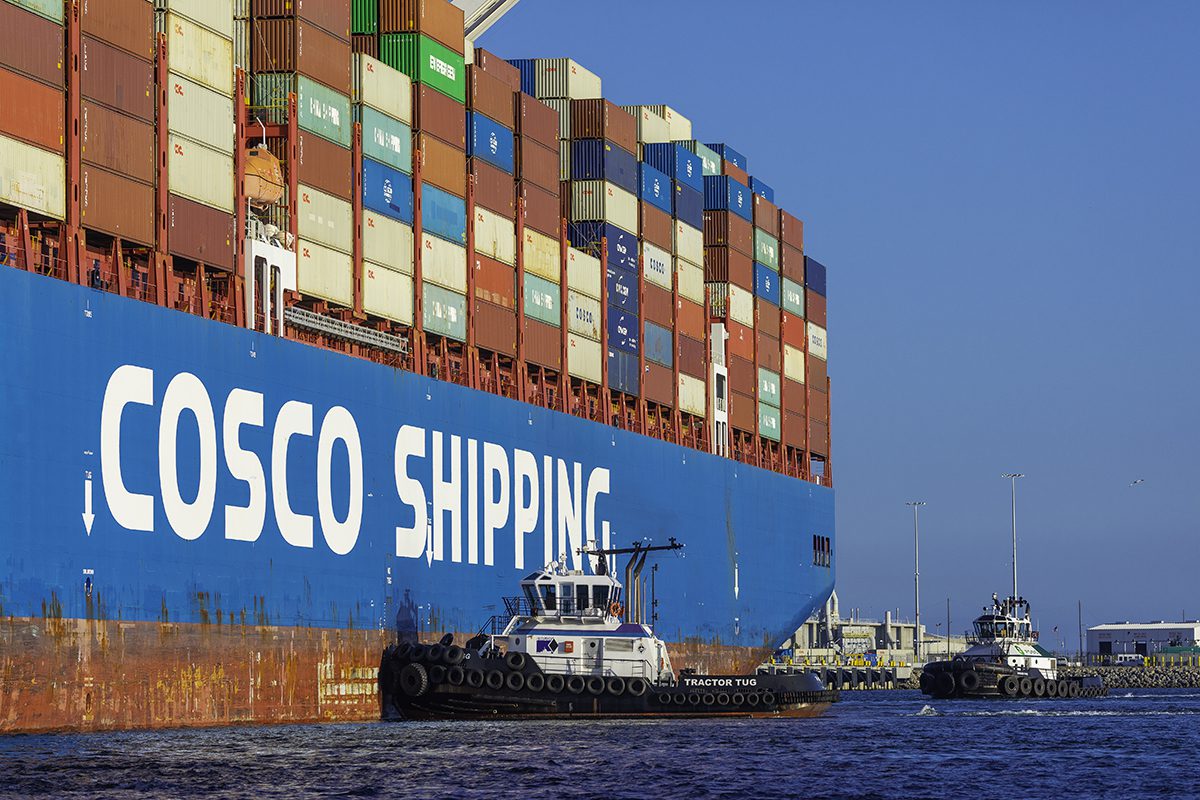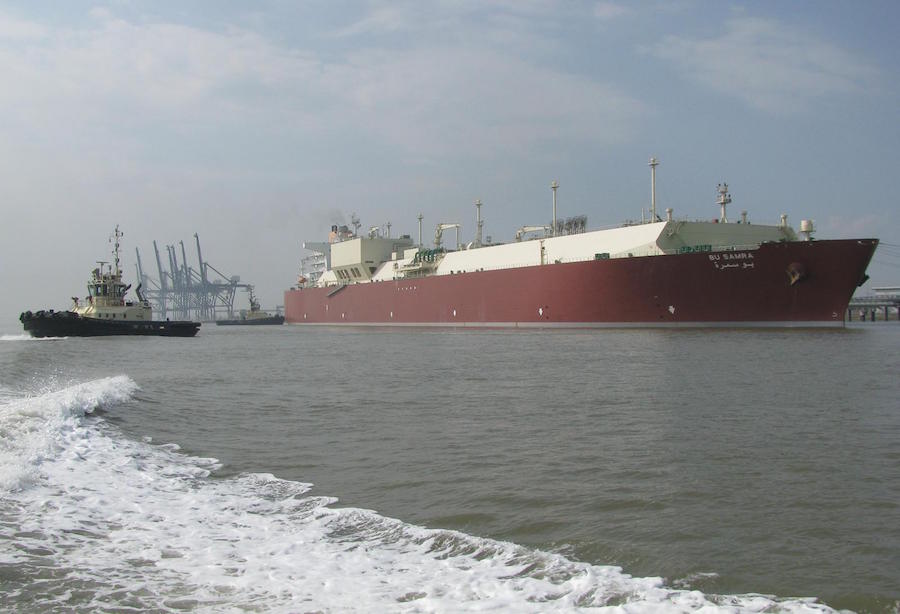
Photo: Left to Right, Robert J. Whitney; Jr.- ABS, Jeffrey Lantz, USCG; Jeanne Grasso, President of WISTA USA and partner at Blank Rome LLP; Stacey H. Mitchell, Department of Justice (at podium).
At its Annual General Meeting in Washington, DC last week, more than 70 WISTA USA members and guests gathered to discuss issues of concern to the maritime community. Leading authorities from the U.S. Coast Guard, the U.S. Department of Justice, regulatory and trade associations, and the U.S. Congress met with shipping professionals to discuss and debate the current status of environmental and enforcement issues and the impact of the 112th Congress on the industry, and to examine strategies for moving forward.
“WISTA USA meets annually in various cities around the country”, stated WISTA USA President and Blank Rome LLP partner Jeanne Grasso. “We took advantage of the meeting in Washington to invite high-level public and private sector leaders in our industry to participate in substantive discussions with our membership on Coast Guard regulatory issues, Department of Justice enforcement initiatives and legislative action in Congress. Needless to say, there was a lot to cover.”
Rear Admiral Frederick J. Kenney, the United States Coast Guard’s Judge Advocate General, opened the proceedings with an overview of the Deepwater Horizon incident, citing many of the challenges faced during the response effort. Despite this being the first instance of a “Spill of National Significance”, it was not the largest oil spill on record. “The largest spill occurred during the first Gulf war,” RADM Kenney reminded the group. “The largest spill in the United States was was a land-based spill in Kern County California in the early part of the last century.”

Jeffrey Lantz, Director of Commercial Regulations and Standards for the United States Coast Guard and the U.S. nominee for Secretary General of the IMO, followed with a description of the rulemakings currently in the pipeline, how many had been concluded, and his belief that with the arrival of new Coast Guard personnel, the processes would be accelerated. Even so, Mr. Lantz noted that with respect to significant rulemakings, they can take several years from start to finish.
Stacey H. Mitchell, Chief of the Environmental Crimes Section of the US Department of Justice, mapped out her goals for that agency. After stating that “80,000,000 gallons of oil, or 8 times the Exxon Valdez spill, are intentionally and illegally discharged from vessels every year”, Ms. Mitchell underscored her intention to eradicate this practice. In addition to better coordination amongst U.S. federal agencies and international counterparts, Ms. Mitchell asserted that her department will “Focus on responsible corporate officials, and seek enhanced sanctions where warranted. We are also seeking support from industry to expel intentional MARPOL violators from responsible maritime organizations.” Further suggestions included approaching P&I clubs to prevent compensation of fines and/or to institute a premium surcharge to companies for intentional criminal violations, or a possible premium concession for compliant companies.
Ms. Mitchell expressed her concern about the increase in Oily Water Separator prosecutions, which was echoed by RADM Kenney who indicated that the incidence of violations was on the rise.
Dabney Hegg, Professional Staff Member, Subcommittee on Transportation, Housing and Urban Development and Related Agencies, Senate Committee on Appropriations, offered the most discouraging news: “This Congress will not advance the agenda of the maritime community”, she stated. “In former years, you had Senators Ted Stevens, Trent Lott, Ernst Hollings and John Breaux, who had maritime issues in mind, and, when appropriate, could be counted on to stand up. Those maritime leaders are gone, and where we are now is a static state.” When asked about the potential demise of the Jones Act, Ms. Hegg replied: “As long as my heart beats, I will defend the Jones Act.”
Jean Godwin, Executive Vice President of the American Association of Port Authorities, focused her presentation on critical infrastructure needs, and the resources to get projects done. “The federal government does not fully utilize the Harbor Maintenance Tax (HMT) for its intended purpose”, Ms. Godwin claimed. “Our infrastructure, including dredging, needs $1.3-$1.5 billion annually. Through the Harbor Maintenance Tax, the government collects $1.5 billion, but these funds are not dedicated to dredging. We need to improve our nation’s transportation infrastructure on the land and waterside to increase competitiveness and our ability to accommodate trade growth and expanded exports.”
During the business meeting portion of WISTA USA’s AGM, Jeanne Grasso welcomed the establishment of a new WISTA USA Chapter in the Pacific Northwest under the leadership of newly appointed Chapter President Captain Katharine Sweeney. “Not only does the United States have the largest membership in WISTA International, but we continue to grow and expand geographically as demonstrated by this new chapter”, said Grasso.
Delegates also had an opportunity to network while touring the Freer/Sackler galleries of the Smithsonian Museum and the U.S. Capitol, watch the House of Representatives debate amendments to an energy bill, and take boat cruise on the Potomac River.
WISTA is an international organization for women in management positions involved in the maritime transportation business and related trades worldwide. WISTA is a major player in attracting more women to the industry and in supporting women in management positions. WISTA USA has eight chapters around the United States with over 230 members from 20 states.
For more information about WISTA go to www.wista.net

 Join The Club
Join The Club












